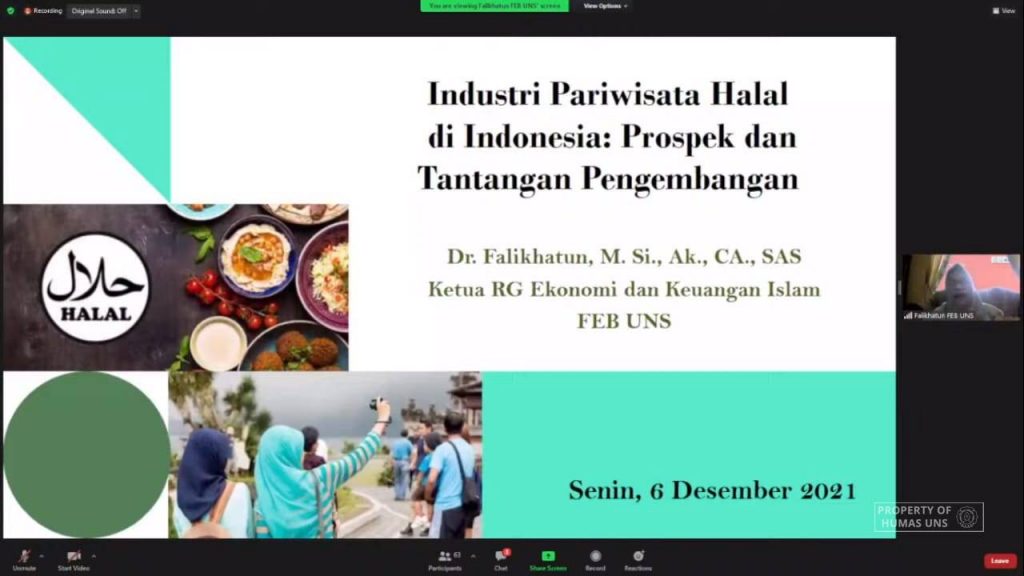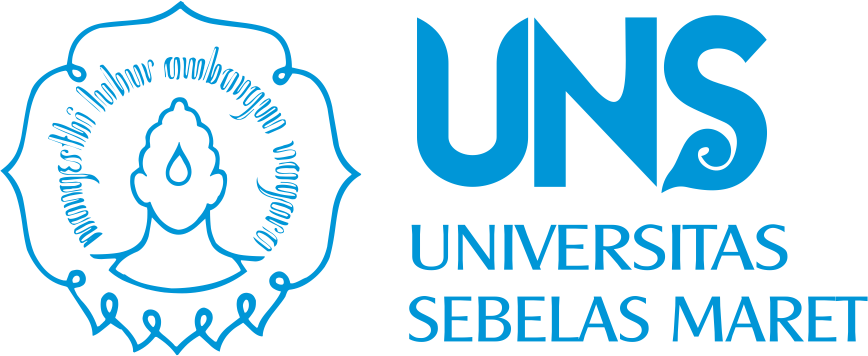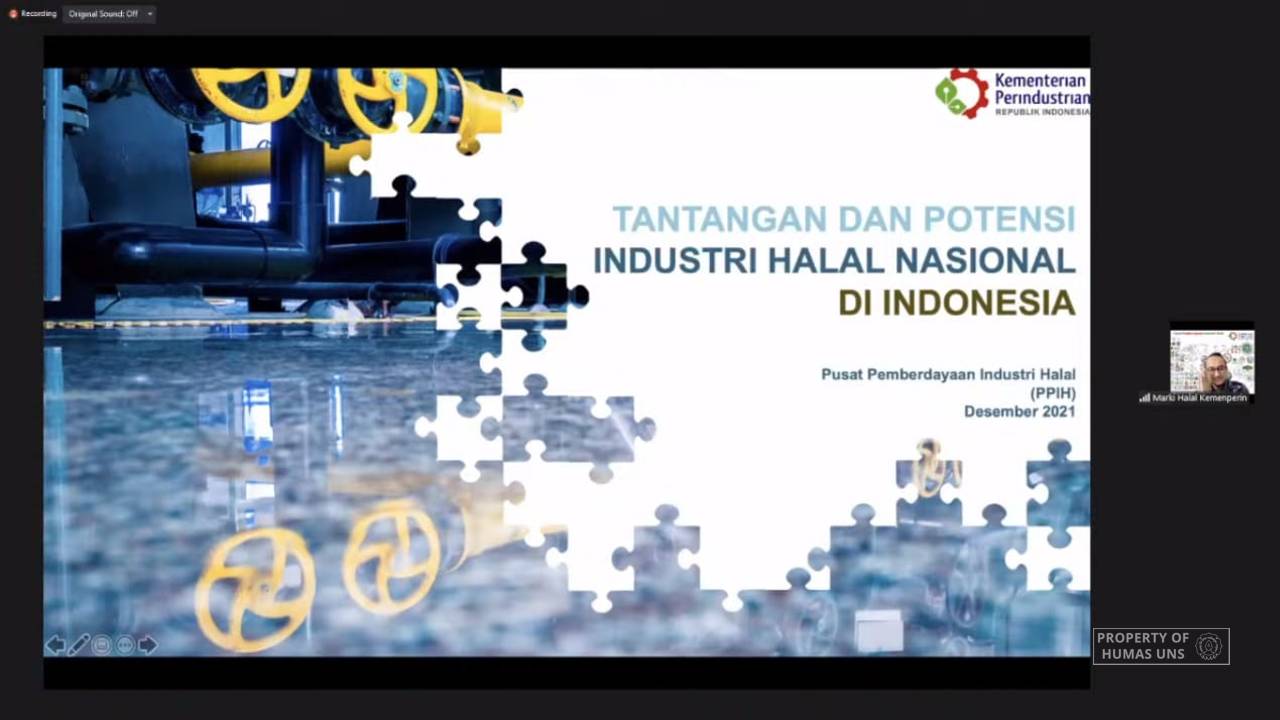UNS — The Guest Lecture from the Faculty of Economics and Business (FEB) Universitas Sebelas Maret (UNS) Surakarta discussed the prospect and challenges for the development of halal industry in Indonesia, which received increasing interest from the local industry players. Two speakers were invited in the offline and online event held through the Zoom Cloud Meeting and Konimex Hall FEB UNS. These two speakers were the Chairman of Center for Halal Industry Empowerment Ministry of Industrial Affairs, Junadi Marki, ST., M.T. and FEB UNS faculty members, Dr. Hj. Falikhatun, S.E., M.Si., Ak.
Prof. Izza Mafruhah, as the Vice-Dean of FEB UNS, mentioned in her opening remark that the halal industry had become a prima donna in the industrial world. The sharia economy in Indonesia is not only developing in the banking sector but also in the industrial sector.
“Many creative industries are moving towards the halal industry. For example, in fashion, medicines, tourism, culinary, and others,” Prof. Izza explained on Monday (6/12/2021).
The halal industry is by no means new in Indonesia. Many efforts have been taken to create an exciting image for the industry, with halal industrial areas implementing a halal process in their production process. The potential of the halal industry is increasing, as Junadi Marki explained that the potential covers five aspects, Muslim population, export potential, food and beverage sector industry prospect, exporter, and halal product market.
Junadi explanation was also supported by the data from the State of Global Islamic Economy Report 2019/2020 and 2020/2021 that reported growth in several halal industry sectors in Indonesia. For example, Indonesia is ranked 4th in the Top 10 Halal Food 2020/2021, a great improvement considering that Indonesia was not in the Top 10 Halal Food in the previous period. Indonesia was also ranked 6th in the Top 10 Pharma & Cosmetic and 5th in the Top 10 Media & Recreation. Improvement is also observed in the spread of halal industry from Micro and Small Industry (IMK) with 2.31 million in 2019 (52.8%), of which 1.68 million units are food and beverages industries (38.4%). A similar trend is also observed in Large and Medium Industry (IBS) Halal with 11,182 units (35.6%) in 2019, with 7,712 units running in the food and beverages sector (24.6 %). Halal businesses are mostly operating from West Java, East Java, and Noth Maluku. The industry is also supported with Law No 33 of 2014 concerning Halal Product Guarantee.
“Since 2014, the halalness of product, which initially voluntary become compulsory. Product halalness is guaranteed by the state under the Ministry of Religious Affairs, Halal Product Guarantee Agency (BPJPH). In its development, halal becomes a program of priority and concern from the state,” Junadi Marki stated.
The second speaker, Dr. Falikhatun, discussed the halal industry in the tourism sector and emphasized the importance of the halal industry vision that has not been determined by Indonesia. She also mentioned that a similar vision has been determined by countries such as Thailand with its “Global Halal Kitchen,” Japan with “Halal Industry as Key Contributor in 2020,” and South Korea with “Key Destination for Halal Tourism.”

“The halal vision should exist and be used as a guideline in implementing future programs, especially that Indonesia’s population is mostly Muslims,” Dr. Falikhatun stated.
Further, Dr. Falikhatun explained the definition of Islamic Tourism to facilitate people’s comprehension and operationalization of the term, considering the absence of a comprehensive definition in the existing literature that accommodates the factors in the halal tourism sector. Dr. Falikhatun stated that halal tourism is a travel activity using transportation, consumption, and accommodation to tourism destinations that meet the Islamic sharia to improve one’s values before Allah SWT.
She added that four categories are correlated with halal tourism: transportation, consumption, accommodation, and tourism destination, which all need to be integrated.
“Halal tourism industry has the wide opportunity because, in reality, the Indonesian Muslim population has implemented halalan thayyiban as a part of their lifestyle. Halalan thayyiban has become the DNA of Indonesian Muslims, including in dressing. Indonesia is also a big Muslim market,” she explained.
However, despite the opportunities, challenges appear during the pandemic. These challenges include the decrease in people purchasing ability, especially in the middle and lower classes. There is also a lack of government regulation that could improve halal tourism quality, particularly in terms of transportation certified foods and beverages, certified accommodation (hotels and lodging), and tourism destinations that meet Fatwa DSN MUI number 108 of 2016. Therefore, stronger and more government support is needed to develop the halal tourism sector. Humas UNS
Reporter: Rangga P. A.
Editor: Dwi Hastuti

